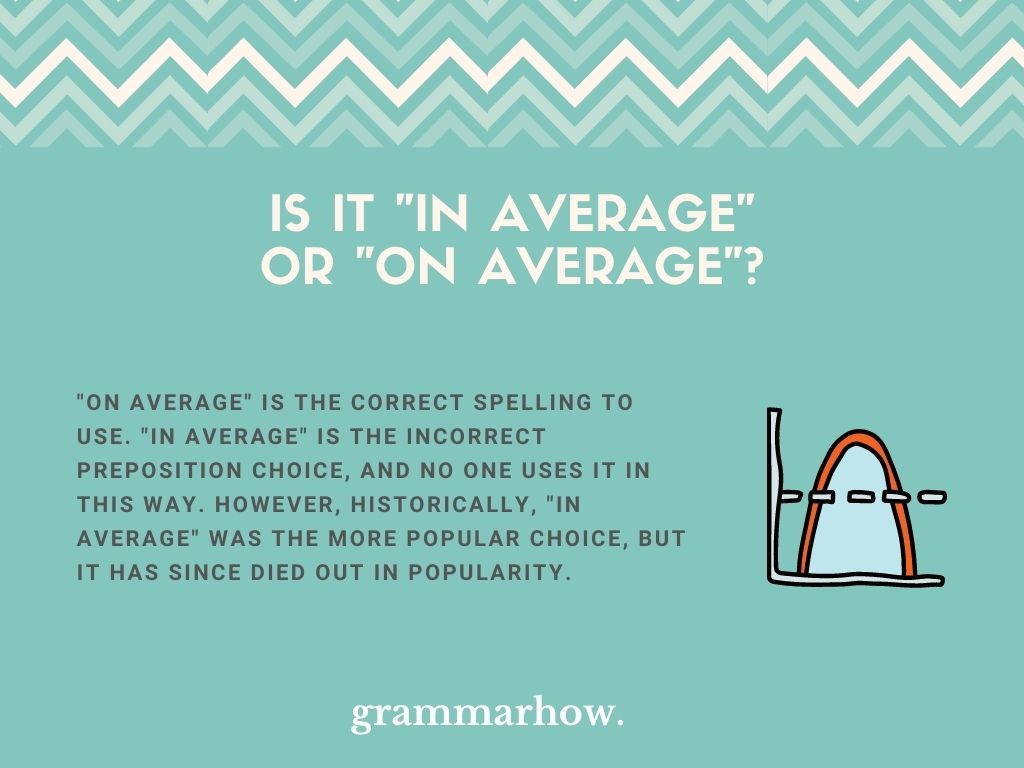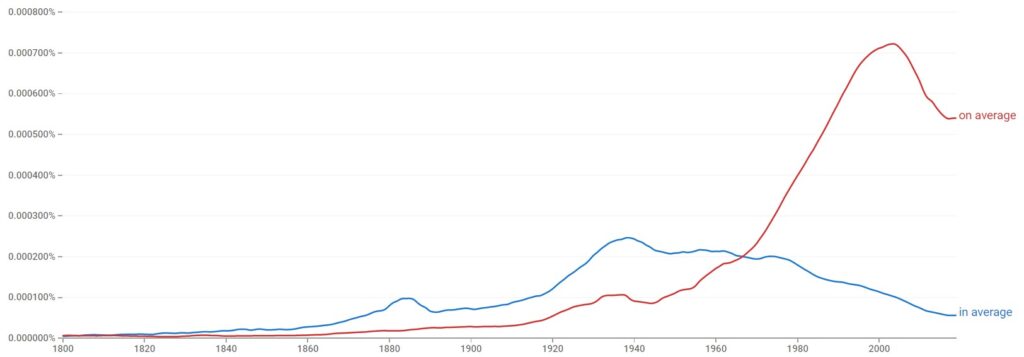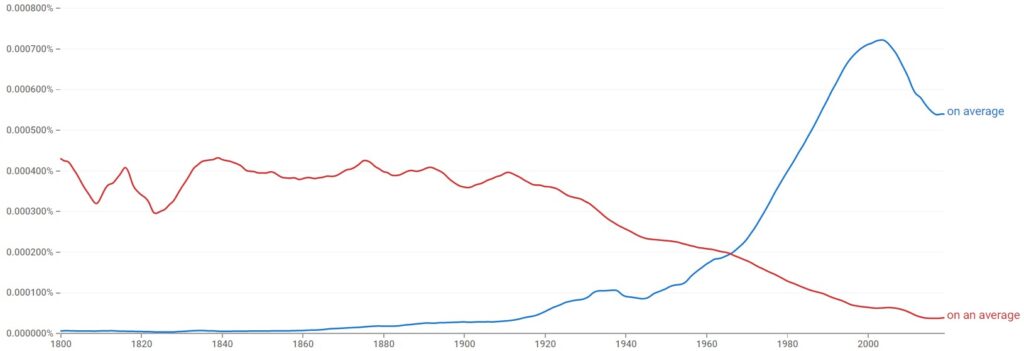“In average” and “on average” use different prepositions to highlight the same thing. However, only one of these forms is correct, and it’s important to know which spelling works best. This article will show you which one to use.
Is It “In Average” Or “On Average”?
“On average” is the correct spelling to use. “In average” is the incorrect preposition choice, and no one uses it in this way. However, historically, “in average” was the more popular choice, but it has since died out in popularity.

How Prevalent Is The Use Of “In Average” And “On Average”?
It will help you to understand which of the two phrases is correct by looking at some popularity statistics. With this, you’ll find out which one is more likely for native speakers to use, thus being the correct form to use yourself.
According to this graph, “on average” is by far the most popular choice, though there was once a time in the mid-1900s where “in average” was common. It seems that “in average” dropped off in the 1960s and hasn’t returned to common usage since.

According to Google, “In Average” is mentioned 3,230 times on The New York Times website, while “On Average” is mentioned 35,000 times.
While both words were once correct, it’s now apparent that “on average” is the only correct form. It’s the only preposition that’s used alongside “average” in common usage and is the only one that’s widely recognized by native speakers.
What Does “On Average” Mean?
Now that we’ve covered which one is correct, it’ll help us to look at the meaning of the phrase.
“On average” means that a value or number is usually correct. That means that we take into account a total number of things and then divide them up into equal parts to try and figure out what they might equal “on average” split across a population.
The definition of “on average,” according to The Cambridge Dictionary, is “usually.”
“Averages” work well when we don’t want to skew our results. In this way, we can take a large number and divide it by the number of results or subgroups that we received. From there, it’s much easier to work out the average of something.
To help you understand what “on average” might mean, look at the following:
- A rich man’s monthly income may be $1,000,000.
- A poor man’s monthly income may be $100.
- If we only took one of these values, our results would be skewed toward one end.
- If we took the full value of every income in the population of the country and divided that number by the number of people we recorded, we’d have an average result.
- Once all calculations have been completed, the average weekly income is $3,000.
- “On average,” the weekly income is $3,000.
You don’t need to do the exact math when you want to use the phrase “on average,” but it helped us in this example to explain it.
Is It Ever Correct To Use “In Average”?
“In average” used to be correct, and the graph that we featured above highlighted this. However, it appears that it didn’t just drop out of popularity over the last few decades, but it completely fell out of the dictionary too.
“In average” is never correct to use. It’s an archaic preposition that no longer works with “average,” and many people will think you’re mistaking “On average” when you use it.
You should make sure never to use it because most people won’t understand why you do. It’s not correct, and “on average” is always the better option.
Examples Of How To Use “On Average” In A Sentence
To show you a little more about how “on average” works, we’ll include some examples. With these, you’ll be able to work out when we use “on average” as a phrase.
- On average, 32 pilots are promoted every year, making our airline one of the most diverse out there.
- On average, 400 people are reported missing every month, which is a number that seriously needs to come down.
- You’ll find that, on average, six out of ten teenagers get involved in some kind of gang.
- I told you that, on average, my mother drinks eighteen glasses of wine every weekend.
- On average, people go through about 1 ton of chocolate every year.
“On average” works when we want to give a general idea of the overall number of something. We might not always have the exact science to back it up, but it works well when we want to show the magnitude of something.
Is It “On Average” Or “On An Average”?
We might also see “on average” and “on an average” used. Both of these phrases are correct, but we use them based on the context of the sentence, making one of them much more common than the other.
“On average” is correct when we want to give a general and usual number for a number of things. “On an average” is only correct when we include another word after “average” to talk about the usual number of that thing (i.e., “on an average salary”).
According to this graph, “on average” is by far the most popular choice. That’s because it’s much more likely that you’ll find a context where it works, while “on an average” is a little more limited in how you can use it.

“On average” requires a number, as you can see in the examples section above. “On an average salary” assumes we already have that number and does the following:
- I can’t even afford a house on an average salary.
- On an average weekly wage, I’ll have a hard time buying any of my luxuries!
On Average – Synonyms
Finally, let’s look at some synonyms and alternatives of using “on average.” While it’s already a great word to use, you might prefer to expand your vocabulary a bit and try one of these:
- Usually
- Generally
- Overall
- About
- Normally
- On the whole
- By and large
- As a rule
These synonyms all work well to replace the general number that you might give when using “on average.”

Martin holds a Master’s degree in Finance and International Business. He has six years of experience in professional communication with clients, executives, and colleagues. Furthermore, he has teaching experience from Aarhus University. Martin has been featured as an expert in communication and teaching on Forbes and Shopify. Read more about Martin here.
